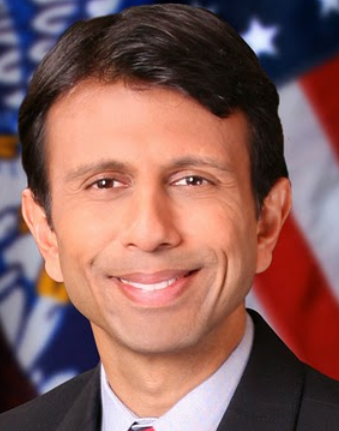I wrote this back in 2007 for my AsianWeek column when I first heard of Bobby Jindal.
Who would of thunk he was presidential timber?
My first impressions still hold true.
And now he wants to be the leader of the free world.
Uncle Bob Jindal: Man of No Color
– October 26, 2007Posted in: Emil Amok
The politics of color is changing in America. For people of color, the best path to success may be to become a “person of no color.”
I caution people in evaluating the apparent success of Bobby Jindal.
Jindal, the first Indian American in U.S. history to be elected governor last Saturday — in Louisiana of all places — is what I call a “man without color.”Normally, you’d describe a person “without color” as white, but even white is a color. Jindal’s a guy who seems to aspire to being totally colorless (that’s not to say bloodless, though we are talking about a professional politician here).
In the past, this sort of character might have been labeled a chameleon, but even that’s not quite Jindal.
He doesn’t change skin tone. His skin is still as dark and constant given his immigrant Hindu parents from Punjab.
But the changes are they’re on the inside, which makes the constancy of his skin tone a tool of deception.
When you see a person of color, you expect someone with similar values, views, beliefs — someone in touch with the emerging new majority. With Jindal, you get someone who very deliberately and proudly downplays his race in order to seek his own individual path. That kind of independence under certain circumstances may be commendable. But only if you happen to agree with his ideas that range from free-market health care, intelligent design instead of evolution, anti-choice and a fenced-in America.
When did Newt Gingrich die and reincarnate?
Whites, of course, regard Jindal as their Asian American Republican Catholic with impeccable Ivy League and Rhodes Scholar credentials.
And boy, are they happy to see a little friendly pigment float into their universe.
But for those in the South Asian community, the joy for Jindal has been mixed. Where’s the breakthrough for Asian Americans when the celebrant hardly acknowledges his ethnicity or doesn’t represent us?
Vijay Prashad, a professor of South Asian history at Trinity College in Hartford, described how Jindal has been portrayed in the Indian American ethnic press.
“The fact that he’s of Indian ancestry is a subject of jubilation,” said Prashad in the New York Times. “But there’s a very shallow appreciation of who he really is. Once you scratch the surface, it’s really unpleasant.” In other words, can you praise him and still hold your nose at the same time?
We have seen this before. South Asians have already had Dinesh D’Souza. Filipinos have current Fox darling Michelle Malkin. But they’re mere right-wing commentators, not elected officials.
Jindal may be the political empowerment version of the Pogo line, “We have seen the enemy, and it is us.” It’s negative diversity — where the group is abandoned for individual glory.
When Jindal won, even the New York Times saw it fitting to remark how the first words from his mouth weren’t about his historic ethnic victory. It was about LSU’s defeat of Auburn earlier that day. It’s an old trick, a la “We’re all part of the same team. Just us honky-tonk footballers here!”
Is he bridge-building? Or is it an example of the sickening kind of denial that can easily be attributed to ambitious, Darwinian, “every person for himself,” success stories in our minority communities?
Perhaps it shows that immigration can be the “Great American Makeover.”
Yet we know a number of successful Asian Americans, politicians among them, who don’t forget their origins and are truly in step with the struggles of their mainstream community.
In an almost calculated way, Jindal has positioned himself away from racial politics that we know, and toward something else of his making. But how does someone get elected in Louisiana without a solid plan to address post-Katrina infrastructure and build-up?
I was almost willing to give Jindal a pass during his transition and be mildly impressed by his colorless approach. But then came the negative Los Angeles Times story on the rise of Chinese immigrants who give to Hillary Clinton. Nothing illegal.
But the implication was that this strange idea of immigrants being part of the process was somehow unhealthy if only Democrats benefit. The fact is color still matters in politics.
Maybe not to the new governor of Louisiana, whose real name, by the way, is Piyush Jindal.
He adopted the name Bobby because he liked The Brady Bunch. Now he’s created a unique modern character in Asian American political history: “Uncle Bob.”


